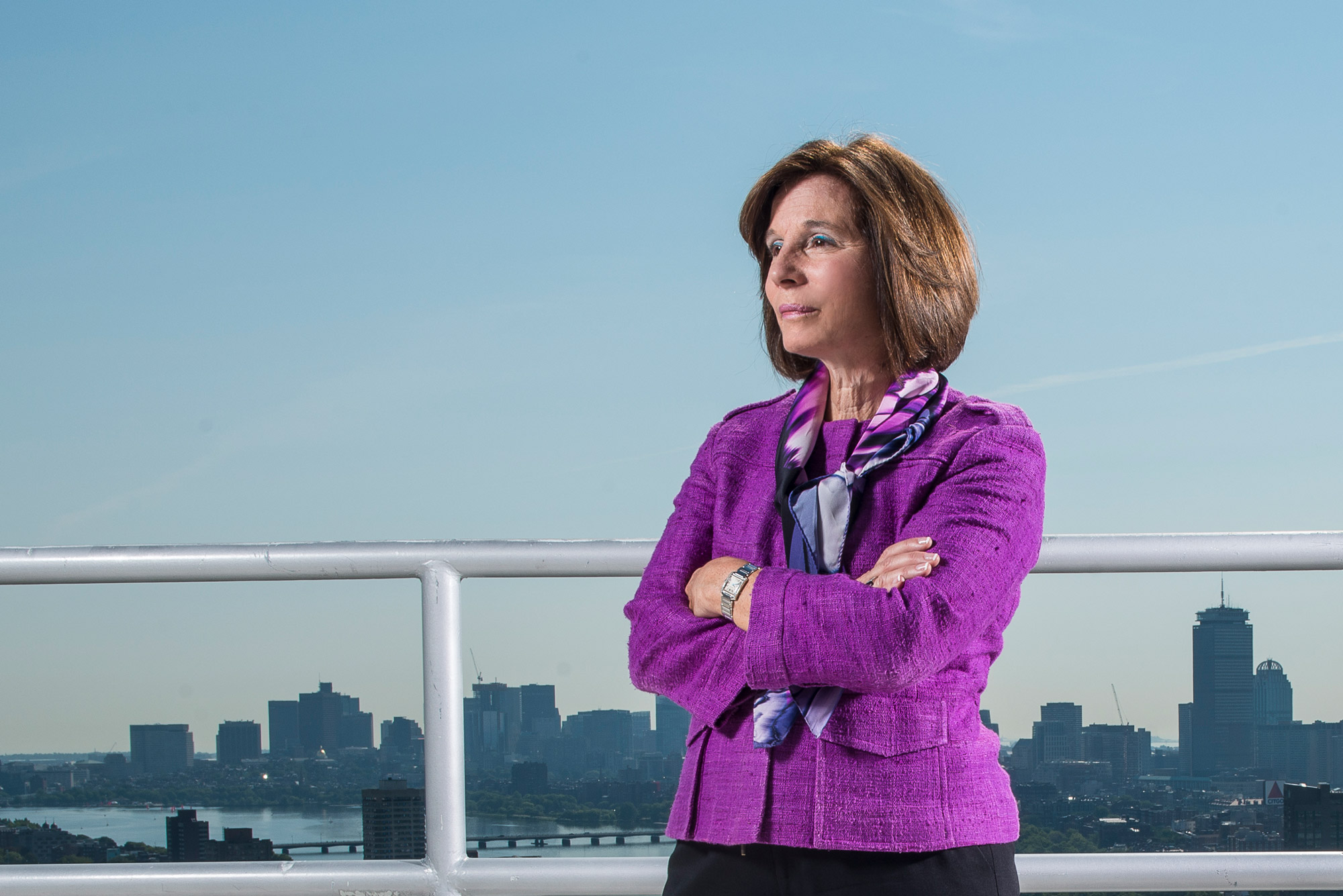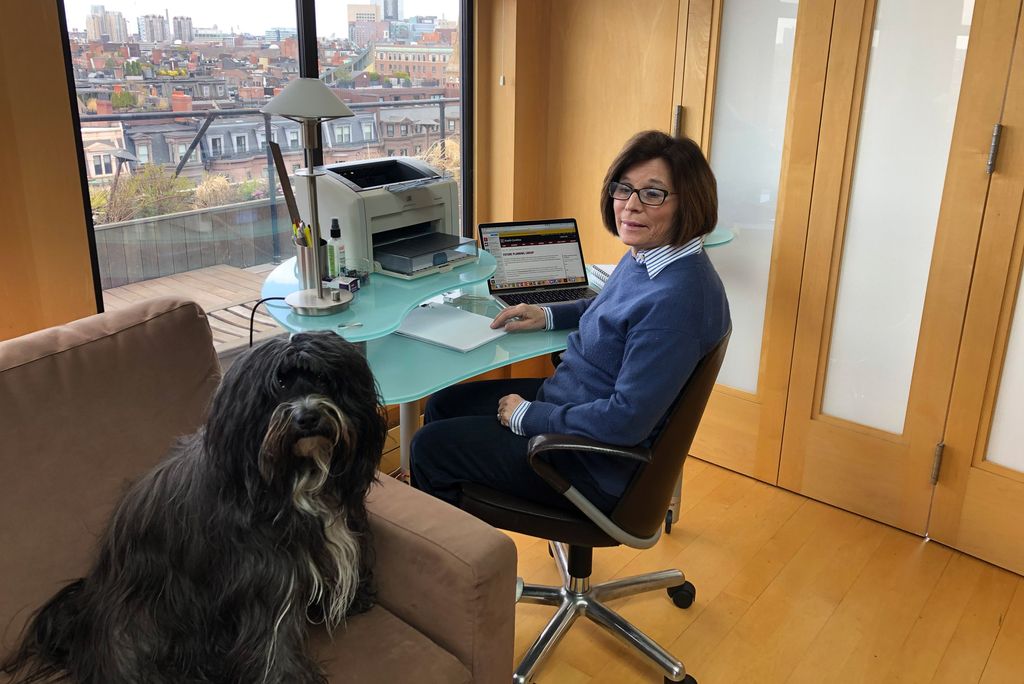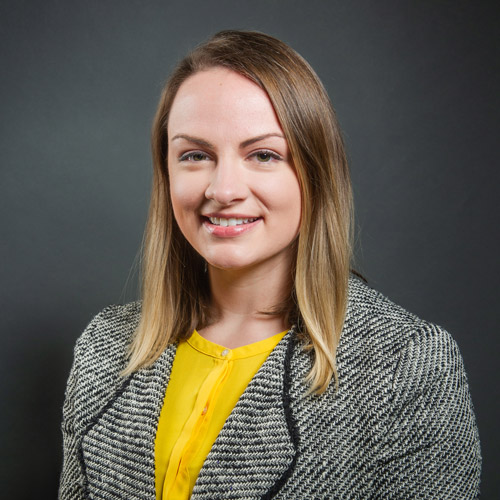After Major Exodus From Campus Labs, BU Research Plans For a Post-Pandemic Return

Photo by Mark Fleming
After Major Exodus From Campus Labs, BU Research Plans For a Post-Pandemic Return
In a Q&A with The Brink, BU’s VP of research talks about the biggest decisions her team’s navigated
As a direct result of the coronavirus pandemic, much of Boston University’s $580 million research enterprise screeched to a stop. But as some projects were able to pivot back to life, particularly ones with direct ties to the fast-spreading virus, BU’s Office of Research had to find a way to physically keep researchers away from each other—and out of BU labs—to prevent community transmission of the SARS-CoV-2 virus responsible for COVID-19.
The Brink spoke with Gloria Waters, BU vice president and associate provost of research, about the difficult decisions her team has made so far through the coronavirus crisis, and how they’re now planning for the future and continuity of research at BU.
Q&A
With Gloria Waters
The Brink: What are some of the most pivotal decision-making moments that the Office of Research and BU’s research community have navigated in the past month or so?
Waters: All the decisions about how and when to ramp down research, and what research to allow to continue—what experiments are essential other than COVID-19 research? And how do you mobilize a whole university of researchers to be prepared to leave their labs, quickly, anticipating that on a particular day the state of Massachusetts could order its residents to stay at home? It’s definitely not something we have done before, or even imagined that we would need to do for such a long period of time. You might have to be prepared to look after facilities and animals during a snowstorm, when most people are stuck at home, but preparing to ramp down for an unknown amount of time? It was really complicated. To start off, thankfully, some of the major departments of research operations already had continuity plans in place. There are continuity plans to care for animal research subjects when, from time to time, there’s a snowstorm or the campus is closed for another reason for a number of days. But these plans had never been used at such an extensive scale as we need them right now. So, we quickly shifted gears.
Looking back, when did you first begin planning for a possible research shutdown due to COVID-19?
It was really only the beginning of March when we thought that this was a real possibility. And just two weeks after that initial inkling, as the coronavirus pandemic took off in the United States, we first asked faculty to start minimizing and cutting back on their lab work and the number of personnel working in their labs. Shortly after that, the stay-at-home advisory came from Governor Charlie Baker. That’s when we drastically cut back on-campus research and made the call that only work on COVID-19-related research or other essential biomedical experiments would be allowed. We developed a database to document which researchers would still be doing work on campus and for what purposes. The vast majority of principal investigators have been excellent about not carrying out research projects that can be done later, when the worst of the outbreak has passed. It’s not surprising—these are scientists who have the utmost respect for public health and the safety of our students.
How is the Office of Research coordinating and encouraging a COVID-19 response from BU researchers?
Really quickly, we learned there were Requests For Proposals (RFPs) coming out from federal funding agencies, looking for COVID-19-related research projects to put money behind. So, the key has been communicating those opportunities to our researchers. Overnight, we got a website up and running where, every day, we post new calls for grant proposals. We also knew that, in addition to letting faculty know about these opportunities, it would be good to do matchmaking of experts—connecting faculty of different academic backgrounds across BU, who might be able to work together on particular research projects. For example, someone with computational expertise from the Hariri Institute might be hoping to work with someone in the life sciences. So, we talked about that matchmaking desire with the BU’s center directors, and we put up a website where researchers can fill out a form that we put into a freely accessible database.
What has been the most inspiring aspect of COVID-19 research that you’ve seen take off at BU?
The most important thing is we have the National Emerging Infectious Diseases Laboratories (NEIDL) up and running—this pandemic situation is what that facility was designed for, and it’s only been fully operational for less than two years. So, it’s really incredible that it’s able to help with the COVID-19 crisis—the people at the NEIDL are working around the clock. And because of that, there’s lots of opportunities for researchers from other institutions to collaborate with the NEIDL. The other really impressive aspect of what’s happening at BU is the breadth of coronavirus research and the way people across all the schools, colleges, centers, and institutes have mobilized around this question of how to pitch in. Our researchers have demonstrated a huge desire to help each other and to deal with the pandemic.
How is the research shutdown impacting the career paths for students, postdocs, and junior faculty?
Sarah Hokanson, assistant provost of professional and postdoctoral affairs, and Daniel Kleinman, associate provost of graduate affairs, sent out a survey to research supervisors to assess how this ramp down has affected the progress of their students, and how they’ve mitigated those impacts. First, it’s important to know that there is a lot of research that happens at BU that doesn’t typically happen inside a lab. Computational work and scholarship in the social sciences and the humanities are less effected. We’ve also learned it’s possible for research to continue without us all physically being on campus—it’s really heartening to see how much great work is continuing on. One of the things that’s become very clear is that people are using this time very productively. There’s a lot of meta-analyses and computational work happening, careful planning of future experiments, people writing up the intros of their dissertations, drafting papers for peer review and publication, and writing grant and scholarship applications. Despite this flurry of remote activity, for the people who rely on the hands-on lab environment for their work, this will set them back.
What about funding—how is the shutdown going to alter grant timelines and funding mechanisms?
We’re discussing this constantly with Jennifer Grodsky and the BU Federal Relations team, as well as the Association of American Universities and other research institutions. The federal agencies have been terrific in terms of enabling researchers to continue using grant and fellowship funding to pay students, postdocs, and lab staff, even if they aren’t doing exactly what they originally set out to do, hands on, in the lab. Because lab work is not getting done, though, it will require more money to accomplish the original research goals that these projects were awarded funding to do. To that end, we’re working to ensure there will be supplements to grants, or timeline extensions. We know there are workable solutions. For example, the United Kingdom’s government agencies have added six months of funding to every fellowship they awarded before the COVID-19 pandemic. One of the concerns we have is what is the best mechanism to allow researchers to apply for these supplements. I think the best thing for universities and their researchers would be if federal agencies gave each research institution a certain amount of funds to distribute internally, rather than having each researcher apply for their own extensions—that would create a landslide of administrative paperwork across the board.
How is your team planning to phase back on-campus research after the COVID-19 storm passes?
We expect in-person and on-campus research will come back much earlier than students will return to campus. When the state says the stay-at-home advisory is gone and non-essential business can come back, we can start to bring researchers back to campus. But it seems clear that it won’t happen overnight—we have to do this in a thoughtful and phased way. We cannot have all graduate students and Ph.D.s working alongside each other, all at once, in the labs. We will have to physically distance people inside laboratories and think about the number of people allowed in a lab at a given time. How do we set up people at lab benches so they have space between them? I don’t expect that we’re all of a sudden going to have lab meetings happening in person again. We might need to have a plan where people can come in on designated days of the week to do their work. Another important area we are considering is human subjects research; we will have to maintain physical distancing and that might not be possible for certain types of human subjects research. Luckily, we’ve already learned that some human subjects research is able to be done remotely, online. We’ve already adjusted Institutional Review Board approvals to allow that shift to happen for some projects.
BU is planning for students to return to campus as early as August. How much sooner than that will on-campus research resume?
I think it will depend on when the state says we don’t have to stay at home, and that could be by mid-May or early June. At that point, we would begin a staggered return. But I think it’s really hard to know how long this is going to last, if there will be a second surge of cases. I think realistically we have to plan that we won’t have the same type of density in the labs for some period of time. Gradually, over summer and the fall semester, we’ll phase back. We’re not going to be holding large meetings or research conferences, although I hope we’ll be able to have smaller research meetings this fall. There’s a lot to be said about the in-person contact we have collaborating around research at BU. We designed the Rajen Kilachand Center for Integrated Life Sciences and Engineering so that people bump into each other in the stairwells, and lab groups are interspersed throughout the building. That kind of organic interaction doesn’t happen on Zoom. We’ve learned we can do some things remotely. But I don’t think it’s a replacement for on-campus collaboration.
Will COVID-19 or antibody testing be part of the back-to-campus plan?
There are several BU task forces working on COVID-19 recovery plans, and the medical group is thinking about that. We will take our guidance from them. If research is coming back in the near future, those options may not yet be widely available. Contact tracing apps could be very useful. When the state says we can come back to work, we want to make sure whoever is coming into the labs and onto BU’s campus is healthy.
How are you doing through all this? How is the COVID-19 pandemic impacting you on a personal level?
What I’ve realized from talking to my colleagues, is that it’s touched everyone personally. When you dig down in conversation with anyone, you can see some aspect of their life has been impacted. For me, my husband is a neurologist at Massachusetts General Hospital, and he was on service the week the pandemic broke in Boston. Over the course of two weeks, he was there as the hospital evolved to being totally focused on COVID-19 care. I’m a Canadian, and my 96-year-old mother is in an independent living facility in Montreal. I thought about bringing her here to stay with us, but very quickly the living facility barred visitors there, and then within two days of that, the border between Canada and the United States was closed. So, she’s in Montreal and she has to stay in her room. I’m worried about her. I talk to her many times a day, and I worry that she won’t be as mobile and active after weeks of having to stay put inside her little apartment. Everyone has these personal stories of how this pandemic is affecting them and their loved ones. The one upside, for me, is that my dog Rufus is definitely delighted about me working from home. I’m curious about what’s going to happen when I go back to work and his life changes again. But lately, his tail wags a lot.


Comments & Discussion
Boston University moderates comments to facilitate an informed, substantive, civil conversation. Abusive, profane, self-promotional, misleading, incoherent or off-topic comments will be rejected. Moderators are staffed during regular business hours (EST) and can only accept comments written in English. Statistics or facts must include a citation or a link to the citation.